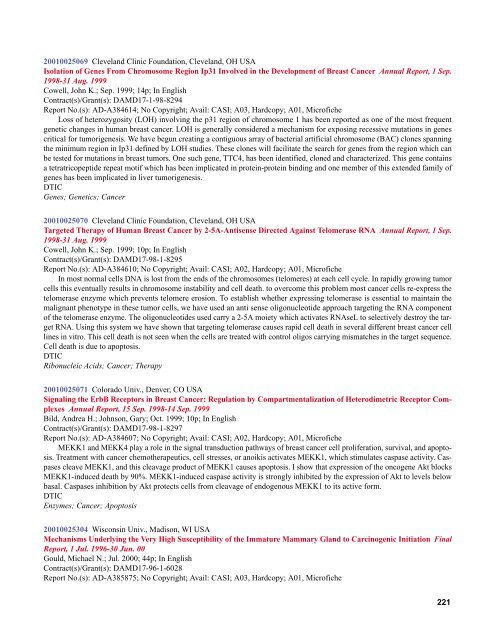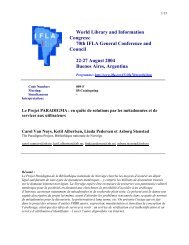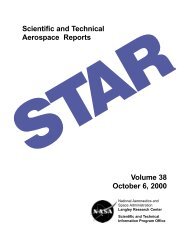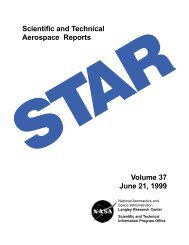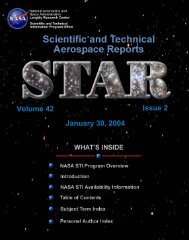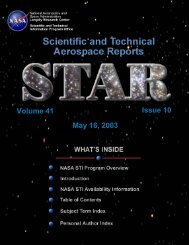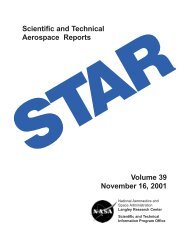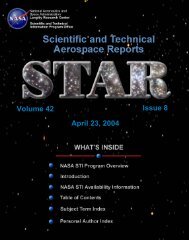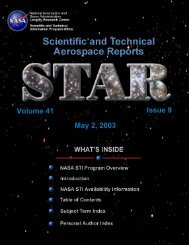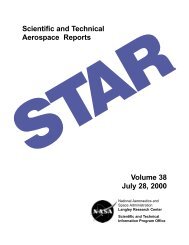Scientific and Technical Aerospace Reports Volume 39 April 6, 2001
Scientific and Technical Aerospace Reports Volume 39 April 6, 2001
Scientific and Technical Aerospace Reports Volume 39 April 6, 2001
Create successful ePaper yourself
Turn your PDF publications into a flip-book with our unique Google optimized e-Paper software.
<strong>2001</strong>0025069 Clevel<strong>and</strong> Clinic Foundation, Clevel<strong>and</strong>, OH USA<br />
Isolation of Genes From Chromosome Region Ip31 Involved in the Development of Breast Cancer Annual Report, 1 Sep.<br />
1998-31 Aug. 1999<br />
Cowell, John K.; Sep. 1999; 14p; In English<br />
Contract(s)/Grant(s): DAMD17-1-98-8294<br />
Report No.(s): AD-A384614; No Copyright; Avail: CASI; A03, Hardcopy; A01, Microfiche<br />
Loss of heterozygosity (LOH) involving the p31 region of chromosome 1 has been reported as one of the most frequent<br />
genetic changes in human breast cancer. LOH is generally considered a mechanism for exposing recessive mutations in genes<br />
critical for tumorigenesis. We have begun creating a contiguous array of bacterial artificial chromosome (BAC) clones spanning<br />
the minimum region in Ip31 defined by LOH studies. These clones will facilitate the search for genes from the region which can<br />
be tested for mutations in breast tumors. One such gene, TTC4, has been identified, cloned <strong>and</strong> characterized. This gene contains<br />
a tetratricopeptide repeat motif which has been implicated in protein-protein binding <strong>and</strong> one member of this extended family of<br />
genes has been implicated in liver tumorigenesis.<br />
DTIC<br />
Genes; Genetics; Cancer<br />
<strong>2001</strong>0025070 Clevel<strong>and</strong> Clinic Foundation, Clevel<strong>and</strong>, OH USA<br />
Targeted Therapy of Human Breast Cancer by 2-5A-Antisense Directed Against Telomerase RNA Annual Report, 1 Sep.<br />
1998-31 Aug. 1999<br />
Cowell, John K.; Sep. 1999; 10p; In English<br />
Contract(s)/Grant(s): DAMD17-98-1-8295<br />
Report No.(s): AD-A384610; No Copyright; Avail: CASI; A02, Hardcopy; A01, Microfiche<br />
In most normal cells DNA is lost from the ends of the chromosomes (telomeres) at each cell cycle. In rapidly growing tumor<br />
cells this eventually results in chromosome instability <strong>and</strong> cell death. to overcome this problem most cancer cells re-express the<br />
telomerase enzyme which prevents telomere erosion. To establish whether expressing telomerase is essential to maintain the<br />
malignant phenotype in these tumor cells, we have used an anti sense oligonucleotide approach targeting the RNA component<br />
of the telomerase enzyme. The oligonucleotides used carry a 2-5A moiety which activates RNAseL to selectively destroy the target<br />
RNA. Using this system we have shown that targeting telomerase causes rapid cell death in several different breast cancer cell<br />
lines in vitro. This cell death is not seen when the cells are treated with control oligos carrying mismatches in the target sequence.<br />
Cell death is due to apoptosis.<br />
DTIC<br />
Ribonucleic Acids; Cancer; Therapy<br />
<strong>2001</strong>0025071 Colorado Univ., Denver, CO USA<br />
Signaling the ErbB Receptors in Breast Cancer: Regulation by Compartmentalization of Heterodimetric Receptor Complexes<br />
Annual Report, 15 Sep. 1998-14 Sep. 1999<br />
Bild, Andrea H.; Johnson, Gary; Oct. 1999; 10p; In English<br />
Contract(s)/Grant(s): DAMD17-98-1-8297<br />
Report No.(s): AD-A384607; No Copyright; Avail: CASI; A02, Hardcopy; A01, Microfiche<br />
MEKK1 <strong>and</strong> MEKK4 play a role in the signal transduction pathways of breast cancer cell proliferation, survival, <strong>and</strong> apoptosis.<br />
Treatment with cancer chemotherapeutics, cell stresses, or anoikis activates MEKK1, which stimulates caspase activity. Caspases<br />
cleave MEKK1, <strong>and</strong> this cleavage product of MEKK1 causes apoptosis. I show that expression of the oncogene Akt blocks<br />
MEKK1-induced death by 90%. MEKK1-induced caspase activity is strongly inhibited by the expression of Akt to levels below<br />
basal. Caspases inhibition by Akt protects cells from cleavage of endogenous MEKK1 to its active form.<br />
DTIC<br />
Enzymes; Cancer; Apoptosis<br />
<strong>2001</strong>0025304 Wisconsin Univ., Madison, WI USA<br />
Mechanisms Underlying the Very High Susceptibility of the Immature Mammary Gl<strong>and</strong> to Carcinogenic Initiation Final<br />
Report, 1 Jul. 1996-30 Jun. 00<br />
Gould, Michael N.; Jul. 2000; 44p; In English<br />
Contract(s)/Grant(s): DAMD17-96-1-6028<br />
Report No.(s): AD-A385875; No Copyright; Avail: CASI; A03, Hardcopy; A01, Microfiche<br />
221


